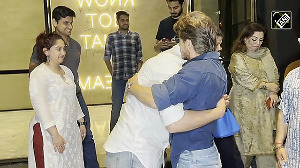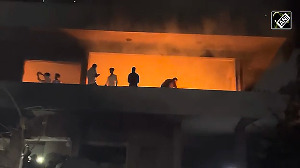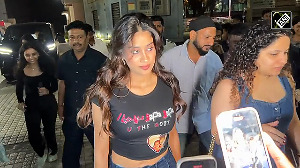'We have been fighting to treat political prisoners differently.'
'Except for Hyderabad and Kolkata, the concept of keeping political prisoners separate doesn't exist in India.'

Sudhir Dhawale, the founder of Dalit rights organisation Republican Panthers and editor of Marathi magazine Vidrohi, was arrested on June 6, 2018, in the Bhima Koregaon case.
After six-and-a-half years in jail, he was released on January 24, 2025. This activist was first arrested on January 2, 2011, from Wardha railway station and charged under the stringent Unlawful Activities (Prevention) Act (UAPA).
He was later charged for being the co-organiser of the Elgar Parishad, an event held on December 31, 2017, to commemorate the 200th anniversary of the Bhima Koregaon battle.
The following day, there were violent clashes and the Maharashtra government set up an inquiry committee to look into the riots.
Dhawale tells Rediff.com Senior Contributor Neeta Kolhatkar that the true meaning of freedom for him after his incarceration is watching birds flying in the sky.
Part one of a two-part interview:
Were you aware that you would be arrested in 2018? Were you under surveillance?
Since 2014, the environment had begun changing in the country. I knew my phone was being tapped as there was a lot of disturbance when I received calls and often, someone would interrupt.
There was surveillance against all those the State perceived as opponents. Yet, I didn't expect the authorities to go to extreme limits.
Do you remember the day (June 6, 2018) you were arrested and picked up by the Pune police from your office in Govandi?
Yes. It was early morning. I usually sleep over in our Sanghatana office. I and four workers were sleeping in the office. Around 6 am, there was a loud bang on the door.
I opened it in my bermudas and undershirt and saw a posse of police with rifles.
They came with an arrest warrant. When I asked them to show it to me, they said I had been charged under UAPA. I knew then that I would be behind bars for 4-5 years at least (laughs).
It all began when an FIR was filed on January 8, 2018, by one Tushar Damgude where he had named me.
We would be arrested based on that and these were bailable sections.
What we didn't expect was being charged under such severe laws as the UAPA.
I was so shocked that I felt darkness in front of my eyes as I would be spending many years in prison.
The police had previously raided my office and premises on April 17, 2018. They didn't even let me wear my clothes saying that the workers could bring them to Deonar police station.
Around noon, they arrested me in a dramatic manner. Some 100 activists and workers from my Sanghatana protested and shouted slogans.
The police saw them and instead of driving from the front gate, they took the gate near the abattoir and drove me to Pune.
Where did they take you?
They took me to Swargate police station where ACP Shivaji Pawar interrogated me. He didn't ask me too many questions.
I told them I would not say anything as I had the right to remain silent. I only answered about the Elgar Parishad and what it was.
They had also arrested five others who were first-timers, so they preferred to focus their questioning on them.
The police already knew I had been arrested a few years ago under UAPA, but was acquitted. At that time, I was in jail for three-and-a-half years.
Do you remember your time in lock-up?
Yes, from Govandi they brought me to Vishrambaug police lock-up. I was literally shoved into the lock-up.
It is a notorious lock-up, dirty, unhygienic and infested with bed bugs. Worse, there was no space to sleep so inmates would take turns to sleep.
The rooms were 10x10 feet. I and the other five would be taken to Swargate for interrogation during the day, and brought to this 'Faraz Khana' lock-up, as it was called, at night. We were here for eight nights.
Prisoners who chewed tobacco and mawa would spit inside these rooms. There was no ventilation.
Worse, the bathing and toilet area were extremely slippery and moss-ridden.
The food was bad too -- rice, watery dal, badly cooked vegetables and chapattis made from the worst quality wheat.
We were given no blankets or bedsheets. As it was summer, we could adjust. After Faraz Khana, they took us to Yerwada prison.

How was your first night in Yerwada?
Around June 16, we were shifted to Yerwada. Across Maharashtra, on the first day in prison, a prisoner is stripped down to his underwear.
They check and note various marks on the body. At the time of release, they check again if it is the same person with the specified markings.
My clothes were brought in by my workers, but not all were allowed. At Yerwada, only two pairs of clothes are allowed.
After that, the prisoners are sent to the 'after' barrack which holds new prisoners. We have to spend one night there.
The following day, the prisoners are given a haircut and clean shave. This is done by other prisoners.
Then, they are presented in front of the superintendent, details of their cases read out and cells allocated. Rona Wilson and I were sent to the Anda Cell.
It is called so because the cells are shaped like an egg. The other three were sent to separate cells.
How was the Anda Cell in Yerwada?
All Anda Cells in Maharashtra are in that shape. Only Taloja jail cells are circular. You have no access to anything.
The walls are shaped like eggs and within it are 15 rooms, six on two sides and three on another side.
In the centre are three rooms which are the offices of the police staff. Every cell is 10x5x6 feet.
There is a toilet and bathroom in the cell and one has to fetch water from a tap outside.
It was only from 2018 that fans were provided in the Anda Cells, so we got them. The cells are opened around 6.30 am and this is the only time we see the sky, though grills.
We are given tea, breakfast and milk. Lunch is around 10.30, 11 am; we get dal, rice, vegetable and three chapattis.
The quality is decent, but the vegetable is unpalatable, so we added chilly thecha or farsan which we got from the jail canteen.
The cells are shut from 12 pm to 3 pm. Then tea is provided and dinner is around 6, 6.30 pm.
The cells were then shut. There were six cells on my side so we could talk to each other.
There were six prisoners from the Bhima Koregaon case and among us, Gautam Navlakha, Anand Teltumbde, Rona Wilson and I are free.
Rona and I were together in the same circle inside the Anda. Surendra Gadling, Ramesh Gaichor and Sagar Gorkhe are still inside jail.

What kind of interactions did you have with fellow inmates?
In the adjoining cells, there was Salim Khan, accused in the Bombay blasts of 1993. He has been in this jail for 32 years.
Then there was a gangster, Ali, originally from Hyderabad, who was arrested and brought from abroad and has been there for the last 10 years.
Then there was Nilesh Ghaiwal, another gangster from Pune. Lastly, there was Rona Wilson.
I never imagined I would be in prison and interact with such hardened criminals. We activists have been campaigning for long to separate undertrials from criminals.
Moreover, we have been fighting to treat political prisoners differently.
Except for Hyderabad and Kolkata, the concept of keeping political prisoners separate doesn't exist in India. There is a human angle to all prisoners even if they are gangsters.
Everyone has a story and yes, Rona and I interacted with the others. For example, Salim Khan shared that he was an ordinary vendor in Manish market, selling clothes and other things.
He was severely impacted by the 1992 riots after the Babri Masjid was pulled down. He felt let down by the then government and the police who failed to protect Muslims.
He was caught after the blasts. He was uneducated and could not read or write.
In prison, he studied Marathi, English, Hindi and Urdu. Now he can speak and write in four languages and read extensively.
In Taloja, we would interact with 600 people. There is a dire need for providing legal help to the poor there.
The biggest problem in Taloja is that prisoners don't get their dates from courts.
Feature Presentation: Aslam Hunani/Rediff.com











 © 2025
© 2025